Editor’s Note – We are inundated by political spin based in very deep divisions and emotions when it comes to Iraq. On the right, left, or anywhere on the political spectrum, opinions often trump fact. Since 2005, SUA has been striving to bring you the facts and why they matter, and that has never been more important than now since ISIS has changed the entire picture.
As part of this effort, MG Vallely and our network have been to the region many times and reported on it since 2003, and we are still reporting on it for your benefit.
Part of that process is to bring experts, not just political mavens to the radio interview, and in conjunction with the article posted here, we hope you will listen in on one of our radio programs that deals with the subject all the way back through the war and beyond.
This past week, SUA had the special privilege to interview “Johnny Walker”, the code name for the man who’s life and exploits are the subject of the book “Code Name: Johnny Walker: The Extraordinary Story of the Iraqi Who Risked Everything to Fight with the U.S. Navy SEALs”.
He appeared last Thursday on the Denise Simon Experience on WDFP Cowboy Logic, the flag ship of Stand Up America US Radio.
Coupled with that program, the following article shares the real truths you need to know, please listen to the whole interview and read the article below.
%CODE%
The Truth About Iraq – And why it matters
By Former VO, Dick Cheney and Liz Cheney – Weekly Standard
As the jihadists of the Islamic State of Iraq and Syria (ISIS) capture territory and establish a caliphate stretching across the now-eradicated Syria-Iraq border, hard-won gains secured with American blood and treasure are being lost. We are watching the rise of potentially the gravest threat to our national security in a generation, one that surpasses even the threat we faced on 9/11.
Against this backdrop, as we debate what our response should be, it has become fashionable in some quarters to say, “Let’s not relitigate Iraq.” It’s not politically expedient, this line of argument goes, to discuss why we invaded Iraq in the first place, or the lessons we learned. This view is wrong on the history, misguided on the politics, and dangerous as a matter of policy.
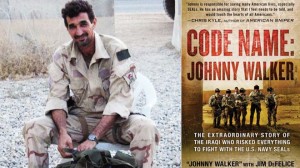
Code Name: Johnny Walker: The Extraordinary Story of the Iraqi Who Risked Everything to Fight with the U.S. Navy SEALs
The larger war, of which the liberation of Iraq was part, is still ongoing. Winning it requires that we understand the truth about the liberation of Iraq, the challenges America faced in the aftermath of the invasion, how we overcame them with the 2007-08 surge, how we defeated Al Qaeda in Iraq and established a stable, functioning nation allied with America in the heart of the Middle East. We must understand how President Obama squandered it all, creating a vacuum in which ISIS, the richest terrorist organization in history, now thrives.
Those who say the invasion of Iraq in 2003 was a mistake are essentially saying we would be better off if Saddam Hussein were still in power. That’s a difficult position to sustain. It is undisputed, and has been confirmed repeatedly in Iraqi government documents captured after the invasion, that Saddam had deep, longstanding, far-reaching relationships with terrorist organizations, including al Qaeda and its affiliates.
It is undisputed that Saddam’s Iraq was a state based on terror, overseeing a coordinated program to support global jihadist terrorist organizations. Ansar al Islam, an al Qaeda-linked organization, operated training camps in northern Iraq before the invasion.
Abu Musab al Zarqawi, the future leader of Al Qaeda in Iraq, funneled weapons and fighters into these camps, before the invasion, from his location in Baghdad. We also know, again confirmed in documents captured after the war, that Saddam provided funding, training, and other support to numerous terrorist organizations and individuals over decades, including to Ayman al Zawahiri, the man who leads al Qaeda today.
It is also undisputed that Saddam Hussein had the technology, equipment, facilities, and scientists in place to construct the world’s worst weapons. We know he intended to reconstitute these programs as soon as the international sanctions regime collapsed.
He had an advanced nuclear program in place prior to Operation Desert Storm in 1991. In 1998, he kicked the international weapons inspectors out of Iraq. He violated every one of the 17 U.N. Security Council Resolutions passed against him.
Anyone pining for the days of Saddam would do well to read the accounts of his 1988 chemical weapons attack on Halabja, Iraq. Listen to the survivors talk about the babies and children who died slow, painful deaths in bomb shelters where they had sought refuge with their families.
The shelters became, as Saddam knew they would, gas chambers. The lesson of Halabja is that Saddam had no compunction, no moral compass, no hesitation to use the world’s worst weapons, including against his own people.
Saddam’s was a reign of terror characterized by torture, rape rooms, the murder of parents in front of their children and children in front of their parents, and the oppression and slaughter of Kurds, Marsh Arabs, and Shiites. George W. Bush captured it well when he wrote that Saddam was a homicidal dictator pursuing WMD and supporting terror at the heart of the Middle East.
Leaving Saddam in power after 9/11, in light of the threat he posed, would have been, as Tony Blair has noted, an act of political cowardice. We are not saying Saddam was responsible for 9/11. What we are saying is that in the aftermath of 9/11, when we saw thousands of our fellow citizens slaughtered by terrorists armed with airline tickets and box cutters, our leaders had an obligation to do everything possible to prevent terrorists from gaining access to even worse weapons. Saddam’s Iraq was the most likely nexus for such an exchange.
Against the weight of historical evidence, some critics claim the Bush administration manufactured or exaggerated the intelligence about Saddam’s weapons programs. The charge doesn’t stand up against the facts. Both the Senate Select Committee on Intelligence and the Robb-Silberman Commission issued bipartisan reports concluding there was no politicization of the intelligence or pressure on analysts to change their judgements about Iraq’s WMD.
In fact, the intelligence assessments about Saddam’s weapons programs stretched back at least a decade:
- A 1993 National Intelligence Estimate found that international support for sanctions was eroding but judged that even if they remained in place, Saddam Hussein would “continue reconstituting Iraq’s conventional military forces” and “will take steps to re-establish Iraq’s WMD programs.”
- A 1994 Joint Atomic Energy Intelligence Committee report assessed that “the Iraqi government is determined to covertly reconstitute its nuclear weapons program.”
- In 2000, a National Intelligence Estimate judged, “Despite a decade-long international effort to disarm Iraq, new information suggests that Baghdad has continued and expanded its offensive BW [biological weapons] program by establishing a large scale, redundant and concealed BW agent production capability. We judge that Iraq maintains the capability to produce previously declared agents and probably is pursuing development of additional bacterial and toxin agents. Moreover, we judge that Iraq has BW delivery systems available that could be used to threaten US and Allied forces in the Persian Gulf region.”
- In late 2000, one of the first intelligence reports that George Bush and I received after our election was entitled “Iraq: Steadily Pursuing WMD Capabilities.”
We weren’t the only ones who read the intelligence. Others who did, going back to 1998, recognized the danger Saddam posed, urged action, and later changed their views when the going got tough. Some of these included: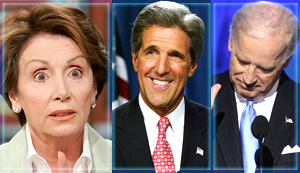
- John Kerry: (2003) “When I vote to give the president of the United States the authority to use force, if necessary, to disarm Saddam Hussein, it is because I believe that a deadly arsenal of weapons of mass destruction in his hands is a threat, and a grave threat to our security.”
- Hillary Clinton: (2003) “Saddam Hussein is a tyrant who has tortured and killed his own people” and “used chemical weapons on Iraqi Kurds and Iranians. . . . Intelligence reports show that Saddam Hussein has worked to rebuild his chemical and biological weapons stock, his missile delivery capability, and his nuclear program,” and Saddam “has also given aid, comfort, and sanctuary to terrorists including al Qaeda members.”
- Joe Biden: (1998) “Ultimately, as long as Saddam Hussein is at the helm, no inspectors can guarantee that they have rooted out the entirety of [his] weapons program,” and “the only way to remove Saddam is a massive military effort, led by the United States.”
- Nancy Pelosi: (1998) “Saddam Hussein has been engaged in the development of weapons of mass destruction technology which is a threat to countries in the region,” and “he has made a mockery of the weapons inspections process.”
- Bill Clinton: (1998) “Heavy as they are, the costs of action must be weighed against the price of inaction. If Saddam defies the world, and we fail to respond, we will face a far greater threat in the future. . . . Mark my words, he will develop weapons of mass destruction. He will deploy them, and he will use them.”
In 1998, Congress passed, and Bill Clinton signed into law, the Iraq Liberation Act, making regime change in Iraq the policy of the United States. A few months later, President Clinton launched airstrikes against Saddam’s WMD capabilities.
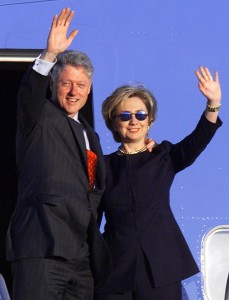 As we know now, Saddam did not have stockpiles of weapons of mass destruction. However, it requires a willing suspension of disbelief and a desire to put politics above safety to assert that the absence of stockpiles meant the absence of a threat to the United States. David Kay, who led the international Iraq Survey Group tasked with finding Saddam’s stockpiles, said this: “I actually think that what we learned during the inspections made Iraq a more dangerous place, potentially, than in fact we had thought before the war.”
As we know now, Saddam did not have stockpiles of weapons of mass destruction. However, it requires a willing suspension of disbelief and a desire to put politics above safety to assert that the absence of stockpiles meant the absence of a threat to the United States. David Kay, who led the international Iraq Survey Group tasked with finding Saddam’s stockpiles, said this: “I actually think that what we learned during the inspections made Iraq a more dangerous place, potentially, than in fact we had thought before the war.”
Saddam’s support for terrorists, his willingness to use the world’s worst weapons, his intent to reconstitute his own programs, including with scientists, technology, equipment, and facilities he kept on hand, his nuclear ambitions, and his thwarting of the international community for over a decade and 17 U.N. Security Council Resolutions combined to form the toxic mix that made Saddam a grave threat to the United States. We were right to invade and remove him from power.
America’s invasion of Iraq also sent a clear message to others in the region that America would take action if necessary. Within a few days of our capture of Saddam, Libyan leader Muammar Qaddafi announced he would like to turn over his nuclear program. He feared he would suffer the same fate as Saddam. Shortly after that, A.Q. Khan, Qaddafi’s supplier of nuclear technology, was also put out of business and placed under house arrest in Pakistan.
Those who say we should not have taken action in Iraq should spend a moment contemplating what the Arab Spring might have looked like with a nuclear-armed Qaddafi in power in Tripoli.
The war to liberate Iraq was indisputably difficult. It included tragedy and challenges we did not foresee. Every war does, but these challenges do not detract from the rightness of our cause. The question is what do you do in the face of setbacks. History has proven that President Bush’s decision to surge forces into Iraq and adopt a counterinsurgency strategy under the command of Generals David Petraeus and Ray Odierno worked.
Success in Iraq was also secured by the skill of people like Ambassador Ryan Crocker and General Stan McChrystal. The methods McChrystal and our special operators developed in Iraq—taking down a terrorist target, exploiting the information found at the site, moving immediately to act on the leads and take down other terrorists—were honed over a number of years. In April 2004, McChrystal writes, they ran a total of 10 operations in Iraq.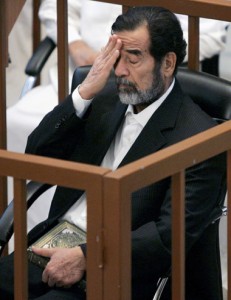
That August they conducted 18. By 2006, his teams had improved their methods to the point where they could average more than 300 operations per month, “against a faster, smarter enemy and with greater precision and intelligence yield.”
These types of operations are a critical tool in the war on terror. They stand in stark contrast to this administration’s actions in Benghazi, for example. Rather than move quickly to uncover critical intelligence and capture or kill those behind the attacks, the Obama team spent 18 months building a legal case before they moved to capture Ahmed Abu Khattala. He has now been read Miranda rights.
The real proof that things were in good shape in Iraq when President Obama took office is that his administration set about claiming credit for the situation. Vice President Biden memorably predicted in 2010 that Iraq “will be one of the great achievements of this administration.” President Obama repeatedly asserted, “We are leaving behind a sovereign, stable, and self-reliant Iraq.”
President Obama spent a good deal of time during his reelection campaign in 2012 claiming to have fulfilled his 2008 promise to “end” the war. His campaign speeches included lines like: “I told you I’d end the war in Iraq and I did”; and “Four years ago, I promised to end the war in Iraq and we did”; and “We’ve succeeded in our strategy to end the war.” With the rise of ISIS in Iraq, that strategy isn’t looking so good.
White House credit-taking has predictably morphed into blame-shifting. In a move that must be uncomfortable even for a president unburdened by a strong allegiance to fact, the administration now claims President Obama was simply implementing George Bush’s policy when he withdrew all U.S. forces.
When President Obama isn’t blaming George Bush for forcing him to remove the troops, he is blaming Nuri al-Maliki for the lack of a stay-behind agreement. Maliki certainly shares the blame for the disaster in Iraq today, but the fact is our commanders on the ground asked for a stay-behind force of nearly 20,000. President Obama said no. They came back and asked for 10,000. President Obama said no.
He was willing to leave no more than 3,500 troops in place, a force too small to carry out the mission. Then, just to be sure Maliki wouldn’t accept our terms, President Obama insisted any stay-behind agreement would have to be submitted to the Iraqi parliament for approval. He made sure Maliki, al Qaeda, Iran, and the rest of the world knew we weren’t serious about defending the gains we had won at such a high cost of American lives and treasure.
In spite of all we have seen, President Obama stubbornly clings to the quaint notion that wars end because he says they do. And even as tragedy and terror engulf Iraq, he insists he will follow exactly the same course of action in Afghanistan.
The rise of ISIS and the resurgence of radical Islamic terror groups across the Middle East present a grave threat to the national security of the United States. The situation is dire, and defeating this threat requires immediate, sustained action across multiple fronts.
In Iraq, we should provide military support in the form of trainers, special operations forces, an intelligence architecture, and airpower to aid the Iraqi military in its counteroffensive against ISIS. ISIS does not recognize the border between Syria and Iraq, and we can’t either. We have to strike ISIS in their sanctuaries, staging areas, command centers, and lines of communication on both sides of the border. We also need to do everything possible to defend Jordan against ISIS.
The Iraqi government is flawed in critical ways, which must be addressed once ISIS is on the ropes. We cannot allow the need for political reconciliation to prevent us from doing what is necessary now to defeat the threat to the United States. By insisting on political reconciliation as a precondition to significant U.S. support for the defeat of ISIS, the Obama administration is ensuring the threat to America will grow.
Each day we dither is another day ISIS is able to solidify its gains. The longer it operates with impunity, the more effective its recruitment. ISIS is using its success on the battlefield to rally thousands of foreign fighters to join the effort in Iraq. Every day we wait means the battle that must eventually be fought will be harder and more costly.
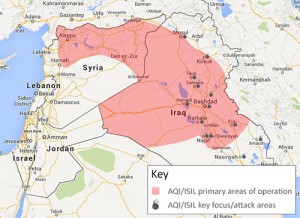 As we work to defeat ISIS in Iraq and prevent the growth of a terrorist state in the heart of the Middle East, we must also move globally to get back on offense in the war on terror. This means, first, recognizing and admitting the size and scope of the threat we face. Al Qaeda is not “diminished,” nor is “the tide of war receding.” We remain at war, and law enforcement mechanisms will not keep us safe.
As we work to defeat ISIS in Iraq and prevent the growth of a terrorist state in the heart of the Middle East, we must also move globally to get back on offense in the war on terror. This means, first, recognizing and admitting the size and scope of the threat we face. Al Qaeda is not “diminished,” nor is “the tide of war receding.” We remain at war, and law enforcement mechanisms will not keep us safe.
Second, we need to reverse the dramatic decline in defense spending we’ve seen in the last six years. A nation at war cannot hope to prevail if only 4 of its 42 Army brigades are combat ready. We need to make restoration of our military and a reversal of the disastrous defense budget cuts one of our top priorities.
Third, we need to halt the drawdown of our troops in Afghanistan. The tragedy, terror, and chaos in Iraq will be repeated in Afghanistan if we abandon the fight there. Pulling out all U.S. troops without regard to conditions on the ground or the recommendations of our commanders will ensure a victory for America’s enemies.
Fourth, we need to reassure our friends and allies in the Middle East that America will not abandon them. We need to demonstrate through increased intelligence cooperation, military assistance, training, joint exercises, and economic support that we know they are on the front lines of the war on terror. We should immediately provide the Apache helicopters and other military support the government of Egypt needs to fight the al Qaeda insurgency in the Sinai.
Fifth, we should be clear that we recognize a nuclear-armed Iran is an existential threat to Israel and to other nations in the region, as well. We should refuse to accept any “deal” with the Iranians that allows them to continue to spin centrifuges and enrich uranium.
In the cauldron of the Middle East today, accepting a false deal—as the Obama administration seems inclined to do—will only ensure Iran attains a nuclear weapon and spark a nuclear arms race across the region. The Iranians should know without a doubt that we will not allow that to happen, and that we will take military action if necessary to stop it.
America must win this war. We won’t defeat our enemies by retreating. We won’t win if we adopt a false narrative about the past, fail to learn the lessons of history, or seek security in disengagement and isolationism. We will only defeat our enemies if we are clear-eyed about the threat and have the will to do what it takes for as long as it takes—until the war is won.
Dick Cheney was vice president from 2001-09. Liz Cheney was the deputy assistant secretary of state for near eastern affairs from 2002-04 and 2005-06.


